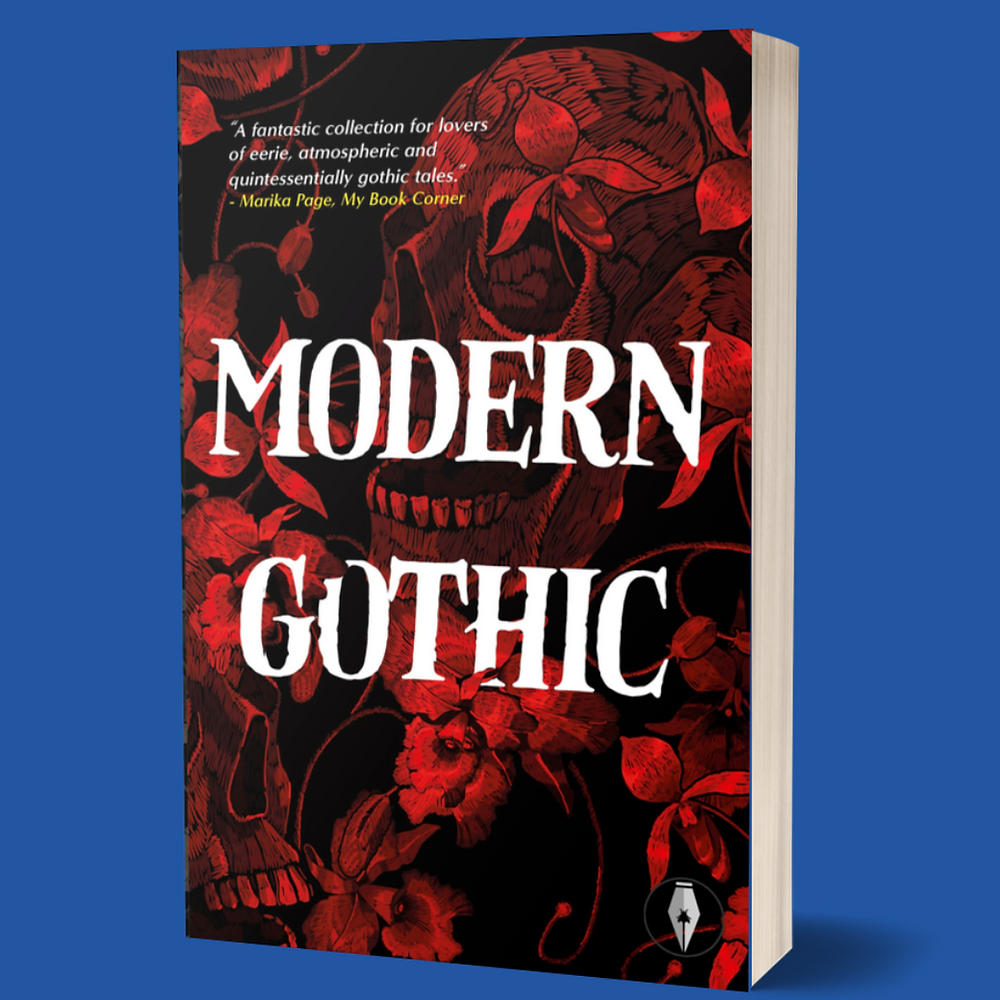Six contemporary writers and their fresh takes on the typical themes of gothic fiction

Modern Gothic | Fly On The Wall Press: £11.99
Reviewed by Lindz McLeod
An oft-touted facet of Gothic fiction is the narrative framing device of a tale within a tale, shown to advantage here in Michael Bird’s opener ‘A Glass House for Esther’. A determined journalist lands an interview with an insanely wealthy man called Cardew, who reveals he built a glass menagerie alongside his house to encourage his daughter Esther’s burgeoning love of zoology. The specimens with which Cardew populates the menagerie range from exotic plants and insects to powerful jaguars and even a family of pygmies; neither Cardew nor Esther seem to consider the purchase and subsequent imprisonment of actual human beings to be any different from the other marvels. Bird’s careful documentation of the family’s obsession with watching the glass-fronted jungle—and their callous attitudes to creatures living or dying— ironically provides the reader with their own glass-front with which to watch a vein of ugly classism and narcissism wending its way through the story.
Pete Hartley’s ‘Livid’ follows Alban Greystone, another journalist, this one haunted by the strange spectre of a woman he knows to be still living—former assistant Lazuli, who performed alongside her magician husband Lapis. Greystone’s laudatory review of Lazuli (but not Lapis) a few months earlier drove a wedge between magician and assistant, providing a catalyst for the destruction of the relationship both on-stage and off. The use of doubles or doppelgangers in Gothic fiction—supernatural shadow selves, usually amoral or able to act in ways the character feels socially unable to—are used to draw the reader’s attention to a divided self, struggling with their own conscience, though Hartley’s decision to have a main character haunted by someone else’s doppelganger makes for an original read.
Lauren Archer’s ‘The Rot’ also delves into the supernatural, though in a very different way; the unnamed narrator is haunted by a creeping, powdery mould in their IKEA-furnished flat which begins to grow on their body in “tendrils of white floss”. They dream of liminal spaces, and in waking life hear distant flatmates who are never glimpsed, leaving them drowning in a loneliness so quiet it screams off the page. Archer’s prose lends itself well to body horror, with sentences winding around the reader until—despite the emptiness of the domestic space—the reader begins to feel almost as constricted as the protagonist.
Dreams are often used in Gothic fiction to blur the lines between reality and fantasy, and never have those lines been more blurred than in ‘The City Where One Finds The Lost’ by Lerah Mae Barcenilla. The protagonist claims she was saved from a childhood illness by the appearance of the healer’s granddaughter, Anastacia, but nothing is quite what it seems. Beginning with a dream, Barcenilla weaves a clever tapestry of local mythology, young queer love, and foreboding imagery; an illusive, yet substantial story that will leave the reader feeling deeply unsettled. “The petals are mottled with black spots, like someone has pressed their fingers against them too hard and left an archipelago of bruises in their wake.”
In another vein entirely, ‘Dark Water: An Appalachian Ohio Story’ by Edward Karshner focuses on religiosity and compulsion. Corrupted clergymen (and women) have long been part and parcel of gothic fiction, and Reverend Richard Hanson showcases what happens when irritation, buoyed by a deep-seated sense of superiority and ecclesiastical authority, becomes a downright obsession. When a female parishioner’s refuses to give up her own land, Hanson is outraged, and his attempts to persecute her begins with a cup of tea and ends, inevitably, in righteous violence. Karshner’s prose is poetic and jagged by turns, rendering the final climactic scene truly thrilling. “There is but one order,” Hanson claims, likening himself to Noah. “All others are a crooked path.”
The urge to compare ‘A Respectable Tenancy’ by Rose Biggin to Shirley Jackson’s famous and shocking short story ‘The Lottery’ is understandable but not entirely accurate, not simply because Biggin’s tale is entirely epistolary, but because the price of rent for the family in question is—at least to begin with—so small that modern readers might consider the offered deal a bargain in this economy. Even worse, the story begins with an email exchange from a contemporary letting agency who aren’t horrified by the idea, but instead excited to work out how it could possibly be implemented into their current contracts, surprising absolutely no one who has ever rented. Biggin’s story unfolds with keening, distant dread, which sidles closer with every new letter from Eveline to her mother.
A lingering sense of trepidation—whether inspired by one’s own self, or by others, or by one’s surroundings—is palpable throughout the anthology, never allowing the reader to become too cosy or comfortable. Although each story differs in style, they share a poetic sensibility, rendering all six tales eloquent and interesting without being inaccessible. The narrative voices are confident and period-appropriate throughout, conveying a depth of understanding that fans of the genre will appreciate, while the metaphor and morals of each story—some grounded, some fanciful—never stray so far that they cannot hit the mark. Even at its dreamiest, Modern Gothic has something very real to say.
Reviewed by Lindz McLeod
